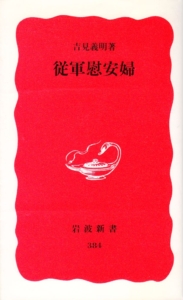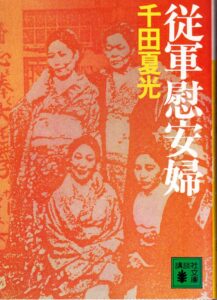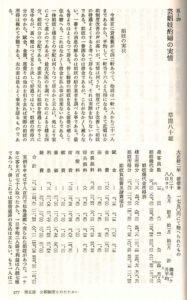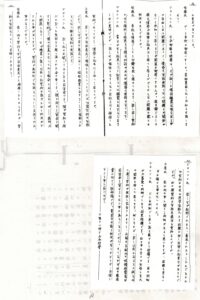Prime Minister Abe Shinzo says that there wasn’t “coercion” or that “authorities entered houses by force and took persons like kidnappers” (Budget Committee of the upper house of the Diet, March 5th, 2007). And Osaka city mayor Hashimoto Toru also says that there isn’t evidence that “comfort women” were taken “by the military by means of assault or intimidation” (News conference, August 21st, 2012).
Both Prime Minister Abe and city mayor Hashimoto says that unless ①the military authorities ②took (“abducted” in legal terms) them using assault or intimidation, it wasn’t forced prostitution. There is a big deception here.
When women were enlisted in Korea and Taiwan, the Japanese military selected business operators and let these operators enlist them. (In some cases, the Governor-General was requested by the military to select business operators.). These operators were called “zegen”, and routinely committed trafficking in persons or kidnapping (using deception or flattery), and they frequently used the same means to enlist “comfort women”.
These are crimes in violation of Article 226 of the Japanese PENAL CODE. Considering the fact that coercion means forcing someone to do something against their will, kidnapping is regarded as forced prostitution. Since it is economic coercion of the victims, trafficking in persons should be regarded as forced prostitution. If a women was taken by means of kidnapping or trafficking in persons to comfort stations and forced to provide sex to military personnel, it is regarded as forced labor. The military bears very grave responsibility. Mr. Abe and Hashimoto won’t see these simple and clear facts.
Is it really the case that evidence that women were transported out of the country from Korea or Taiwan by means of kidnapping or trafficking in persons comes only from testimony from victims? No. There is much evidence, as below.
American military material reveals the truth. The “Report No. 49: Japanese Prisoners of War Interrogation on Prostitution” (October 1st, 1944) by the United States Office of War Information, Psychological Warfare Team, is now famous. In relation to the fact that many Korean women were taken to Burma by means of kidnapping or trafficking in persons, this report records as follows:
“Early in May of 1942 Japanese agents arrived in Korea for the purpose of enlisting Korean girls for “comfort service” in newly conquered Japanese territories in Southeast Asia. The nature of this “service” was not specified but it was assumed to be work connected with visiting the wounded in hospitals, rolling bandages, and generally making the soldiers happy. The inducement used by these agents was plenty of money, an opportunity to pay off the family debts, easy work, and the prospect of a new life in a new land, Singapore. On the basis of these false representations many girls enlisted for overseas duty and were rewarded with an advance of a few hundred yen.”(Edited by Yoshimi Yoshiaki, “Comfort women material collection”, material No.99, Otsukishoten)
This comes under a crime of kidnapping for transportation out of a country. Rewarding an advance of a few hundred yen, this also comes under a crime of buying or selling human beings for transportation out of a country. According to this American military record, some 700 Korean women were deceived into enlisting, they were bound to Army regulations and to war for the “house master” for a period from 6 months to a year, and this contract was renewed after the expiration of the period. This is a crime in which the military is a principal actor and the operator is an accessory. This is forced prostitution.
Let’s look at a record about a Korean woman who was kidnapped and taken to comfort station in Rangoon, Burma. This is a recollection by an ex-correspondent of the Yomiuri Newspaper, Omata Yukio (Omata, “Battling areas and correspondent”, Tojusha). In 1942, 40 to 50 women landed at Rangoon from Korea. Hearing that a comfort station was made and news correspondents would be provided with special services, he went to the comfort station with delight. However, the woman who was provided to Mr. Omata at the comfort station aged 23 or 24 and a “public school” teacher (more Precisely, elementary schoolswere called national schools also in Korea after 1941.). Asking why a school teacher came to be in such a place, she replied that she was taken there by means of deception. This is a kidnapping.
According to the woman’s story, there were 8 girls around the age of 16 or 17. She tells the correspondent for the Yomiuri Newspaper that “They wail that they hate this work. Is there any way for them to escape from this work?” After consideration, he replies that “Run to the military police and make a complaint .”, “If these girls run to the military police, they may take some measures. Or they may be punished. Still, is there anything else they can do in Burma at present?”
The girls ran to the military police to ask for help, but the military police had difficulty dealing with them. Eventually, after the military police talked with their employer, the 8 girls ended up working at a commissioned officers’ club. What happened to these girls afterwards? It seems that these girls weren’t sent back for Korea. What happened to the ex-“public school” teacher? She was kept at the comfort station and wasn’t released. The operator who took her wasn’t arrested. Such circumstances occurred on a daily basis.
Nagase Takashi, who was in Singapore as an interpreter at the Fuel Depot of the 3rd Fleet Air Wing, says as follows:
I taught Korean comfort women Japanese about 3 times, and they told me the truth because they knew I wasn’t a soldier.
Mr. Interpreter, to tell the truth, when we went out of the country, we were told were would work as waitresses at a restaurant in Singapore. We were given 100 yen which we gave to our families and went out of the country. When we arrived at Singapore, we were told to be comfort women.
They appealed to me. However, as an interpreter, I can’t do anything which is against the power of the military. I felt sorry for them and thought that they shouldn’t have been taken by means of such a lie. (Edited by Aoyama Gakuin University project 95, “Aoyama Gakuin and departure of students for the front”, self-published, Tokyo metropolitan)
This case is both kidnapping and trafficking in persons.
Ex-Military Police Corporal, Hataya Koji, who investigated the histories of Korean women taken to a comfort station in Hunchun, Northeast China, recollected those days as follows:
Digressing a little, I asked them, “Do you know what kind of work you will do?” Almost all of them replied, “To relieve the soldiers”, “I’m good at singing, and the soldiers will be pleased with my song”, etc, and few women clearly understood that they will have sex with the soldiers. ……The women handed over an advance payment to their parents from a comfort station operator or broker conducting trafficking in persons or their parents received it directly, and they came to Manchuria with their families’ approval. It wasn’t certain whether the contract was justified or not, but everyone said without exception that, “I would like to repay the advance as soon as possible and save money to send it to my parents and brothers.” (Hatanaka Yoji, “Faraway and boundless mountains and rivers”, self-published, Kyoto city)
This case is also both kidnapping and trafficking in persons.
Mr. Hata Ikuhiko also acknowledges that Korean women were taken by means of kidnapping or trafficking in persons. In his book, “Comfort women and sex on the battlefields”, Shinchosha, 1999), he takes 9 examples of testimonies from ex-military personnel he “chose due to their high reliability”. In 4 examples of the cases of Korean women, 3 examples involved kidnapping and 1 example was trafficking in persons (the Others involved 2 examples of kidnapping of Japanese women, 1 example of abduction, 1 example of attempt in Burma and 1 example of enlistment in Singapore.).
Let’s introduce one of them. Ex-Military Police Sergeant, Suzuki Takushiro, heard from a young Korean operator (the second son of a landlord) at a comfort station in Nanning that he took a daughter of a local tenant farmer by telling him that “a contract would be concluded with a café or restaurant directly operated by the military”. He said that this young man “seemed to feel a deep responsibility for forcing a young girl who loved him calling him “Brother” to prostitute”. In this case, the operator was also deceived. This is kidnapping by the military using deception.
For your information, in regards to whether there was abduction by the military authorities using assault or intimidation in Korea, there are many testimonials from victims. At present, other documents, records or testimony confirming this fact haven’t yet been discovered. Still, there isn’t any evidence proving that such cases didn’t happen.
In 1941, under the name of Kwantung Army Special Maneuvers in preparation for the Anti-Soviet War, the Army was mobilized on a massive scale. At this time, it planned to enlist 20,000 “comfort women”, and many women were mobilized from Korea. The number of people enlisted at this time was, according to Senda Kako’s interview with a Staff member of the Kwantung Army, Hara Zenshiro, 8,000, and according to a testimony from Murakami Sadao, who was in the Military Logistics Team of the 3rd Section of the Staff Office of the Kwantung Army, about 3,000. (A letter written by Mr. Murakami to Senda Kako included in, Edited by VAWW-NET Japan, “Records of the Women’s International War Crimes Tribunal 2000 on Japan’s Military Sexual Slavery”, vol.3, Ryokufu Shupan)
If that was the case, as Mr. Hata Ikuhiko said before, there was a possibility that “Eventually, only 8,000 people including prostitutes were listed. Because it was impossible to supply such numbers of people under conventional method in a short period of time, assigned duty was consigned to lower organizations: from Province governor to governor of Commandery to Village mayor…The fact was that “it was partly on persuasion and partly by coercion.” (Kim Il-men, “The imperial military and Korean comfort women”)” (Hata, “Pursue the mystery of Showa history”, last volume, Bungeishunju, 1993) Almost all of the Kwantung Army, Japanese Korean Army and Governor-General of Korea’s materials were burned and don’t remain. However, if materials are discovered, the facts may become clear. On this point, more research is needed.
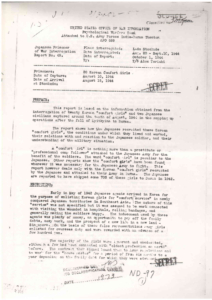
Office of War Information’s material

